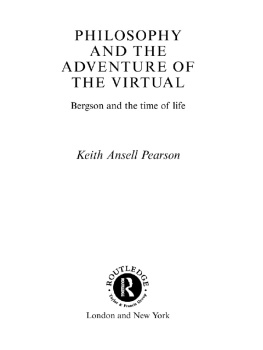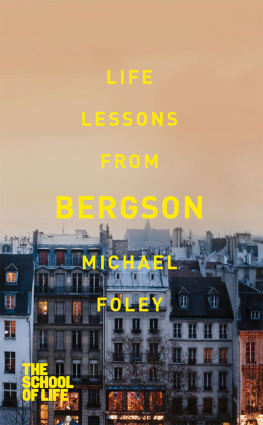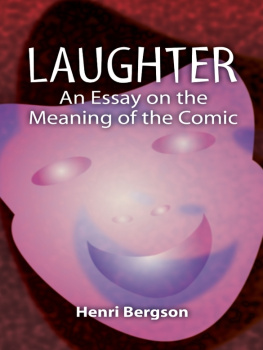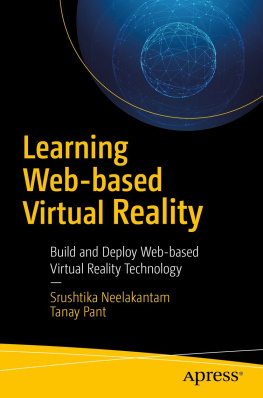PHILOSOPHY AND THE ADVENTURE OF THE VIRTUAL
The concept of the virtual has recently assumed a remarkable level of importance, spanning a diverse range of different disciplines and approaches. Yet in spite of the attention it has received, its precise ontological status is mysterious for many and the extent of its application to time, perception, and memory is largely unexplored and unknown. Philosophy and the Adventure of the Virtual: Bergson and the time of life brings the virtual to centre stage and argues for its importance in thinking anew the central philosophical questions of being and time.
Keith Ansell Pearson examines the nature of continuity, probes relativity, pursues a notion of creative evolution, and outlines a novel approach to perception and memory. Staging a series of encounters between Bergson and philosophers as diverse as Kant, Nietzsche, Russell, Popper, Denett, Badiou, and Sartre, the book provides some genuinely insightful readings of Bergson and endeavours to revitalize Bergsonism for a contemporary audience.
Philosophy and the Adventure of the Virtual is a lucidly written and imaginatively argued volume of essays, and will be of interest to philosophers across the analytic and continental divide and to anyone open to the possibilities of thinking.
Keith Ansell Pearson is Professor of Philosophy at the University of Warwick. His previous books with Routledge include Viroid Life (1997) and Germinal Life (1999).
First published 2002
by Routledge
11 New Fetter Lane, London EC4P 4EE
Simultaneously published in the USA and Canada
by Routledge
29 West 35th Street, New York, NY 10001
Routledge is an imprint of the Taylor & Francis Group
This edition published in the Taylor & Francis e-Library, 2002.
2002 Keith Ansell Pearson
All rights reserved. No part of this book may be reprinted or reproduced or utilized in any form or by any electronic, mechanical, or other means, now known or hereafter invented, including photocopying and recording, or in any information storage or retrieval system, without permission in writing from the publishers.
British Library Cataloguing in Publication Data
A catalogue record for this book is available from the British Library
Library of Congress Cataloging in Publication Data
Ansell-Pearson, Keith, 1960
Philosophy and the adventure of the virtual: Bergson and the time
of life / Keith Ansell Pearson.
p. cm.
Includes bibliographical references and index.
1. Bergson, Henri, 18591941. 2. Time. I. Title.
B2430,B43 A57 2001
110dc21 2001031994
ISBN 0415237270 (hbk)
ISBN 0415237289 (pbk)
ISBN 0-203-46936-4 Master e-book ISBN
ISBN 0-203-77760-3 (Glassbook Format)
The best images and parables should speak of time and becoming.
(F. Nietzsche, On the Blissful Islands, Thus Spoke Zarathustra, 1883)
The only crime is time itself.
(G. Deleuze, Cinema 2: The Time-Image, 1985)
The One expresses in a single meaning (sens) all of the multiple. Being expresses in a single meaning all that differs.
(G. Deleuze and F. Guattari, A Thousand Plateaus, 1980)
ACKNOWLEDGEMENTS
A version of essay three first appeared in Robin Duries edited volume Time and the Instant (Clinamen Press, 2000). A slightly different version of essay four first appeared in Pli: The Warwick Journal of Philosophy, volume 11, 2001. A much shorter and more primitive version of essay five appeared in issue 6 (2000) of Tekhnema: A Journal of Philosophy of Technology, devoted to the theme of Teleologies: scientific, technical, critical, guest edited by G. Banham and S. Malik. I am grateful to the editors of these publications for allowing me to draw on this material for the purposes of this volume.
INTRODUCTION
Problems or Ideas emanate from imperatives of adventure or from events which appear in the form of questions.
(Deleuze, Difference and Repetition, 1968)
The appeal to the originating goes in several directions: the originating breaks up, and philosophy must accompany this break-up, this non-coincidence, this differentiation.
(Merleau-Ponty, The Visible and the Invisible, 195960)
To neglect differences of nature in favour of genres is thus to belie philosophy. We have lost the differences of nature.
(Deleuze, Bergsons Conception of Difference, 1956)
In this volume of essays I approach the question of time and the question of life through the elaboration of a philosophy of the virtual (the conjunction of the two questions constitutes the enigma of the book). In recent years the notion of the virtual has assumed a degree of extraordinary importance for attempts to articulate new experiences of the real (see, for example, the studies by Heim 1993, Levy 1998, Hayles 1999). As a conceptual innovation within philosophic modernity the notion is associated with the work of Bergson and assumes a role of vital importance in the texts of Deleuze. Indeed, Alain Badiou has gone so far as to claim that it is the principal name of Being in Deleuzes thinking. Within Bergson and Deleuze we have the distinction between virtual (continuous) multiplicities and actual (or discrete) multiplicities, a conception of the evolution of life as involving an actualization of the virtual in contrast to the less inventive or creative realization of the possible; the attempt to show that both perception and memory involve virtual images; and, in the case of Deleuze, a thinking of the event as virtual (pure reserve). Deleuzes conceives the virtual as a productive power of difference, a simplicity and potentiality, which denotes neither a deficient nor an inadequate mode of being. Hence the key formula, borrowed from Prousts Time Regained: the virtual is real without beingactual, ideal without being abstract. The virtual presents an ontological challenge to our ordinary conceptions of perception and memory, of time and subjectivity, and of life in its evolutionary aspects. As we shall see in this series of studies, the virtual has important ontological referents and is allied to problems that have been central to philosophy from the beginning. But the notion also works in the context of specific set of modern problems regarding the nature of time, memory, consciousness, and evolution.
This volume takes as its focus certain key texts of Bergson and the writings of Deleuze on Bergsonism (especially the 1956 and 1966 readings and the two volumes on cinema from the 1980s), and it offers a set of close readings of the movements of Bergsonian thought and of key texts such as Matter and Memory (henceforth abbreviated to MM) and Creative Evolution (henceforth abbreviated to CE). I write out of the conviction that these texts merit being placed at the centre of our appreciation of twentieth-century philosophy and that they continue to have an important contribution to make to the staging of philosophical problems today. Deleuzes Bergsonism of 1966 is significant since it was the first reading to see that what unites the whole of Bergsons thinking from the treatment of psychic states in Time andFree Will (henceforth abbreviated to TFW) to the presentation of a new conception of evolution in Creative Evolution is the idea of a virtual multiplicity. This volume has set itself a fairly specific task, however. It is not making any contribution to a contemporary thinking of the virtual inspired by the new sciences of chaos and complexity theory. I encourage readers interested in contemporary applications and utilizations of the virtual, in current architectural theory and practice, and in the domain of new theory in general, to look at the texts by Cache (1995) and Rajchman (1998 and 2000), and, in relation to chaos and complexity theory, the forthcoming text of Manuel de Landa. My specific, and limited, task in this volume is twofold: to contribute to the correction of Bergsons erasure from our image of post-Kantian philosophy, and to contribute to our comprehension of Deleuzes unique conception and vision of philosophy. The virtual remains for many people, including readers of Bergson and Deleuze, something of a mysterious and tricky notion. In this volume I seek to clarify its status and demonstrate the kind of philosophical work it is doing and can contribute to. The first essay introduces the notion of a virtual multiplicity in relation to time and how we think continuity and I attempt to provide an introduction to its essential features. The second essay tries to make sense of Bergsons idea of single time by examining the nature of his engagement with Relativity. The third essay takes the problematic of duration and evolution and explores how the difference between the virtual and the possible might be important for how we construe the creative or inventive character of evolution. The fourth essay looks at the notion of the simple virtual and from the point of view of a renewed ontology of the One. Here I take to task Badious reading of Deleuzes thinking as a Platonism of the virtual and seek to demonstrate that the renewed thinking of the One Deleuze undertakes constitutes an intrinsic part of his overriding commitment to pluralism. The fifth essay examines Bergsons response to Kant in an effort to clarify key aspects of his thinking and argues that, conceived as an image of thought, the











